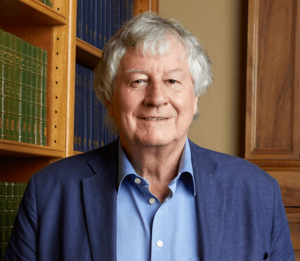Adrian Smith (statistician) facts for kids
Quick facts for kids
Sir Adrian Smith
|
|
|---|---|
 |
|
| 63rd President of the Royal Society | |
| Assumed office 30 November 2020 |
|
| Preceded by | Venki Ramakrishnan |
| Personal details | |
| Born |
Adrian Frederick Melhuish Smith
9 September 1946 Dawlish, Devon, England |
| Residence | UK |
| Alma mater | University of Cambridge University College London |
| Awards | Guy Medal (Bronze, 1977) (Silver, 1993) (Gold, 2016) |
| Scientific career | |
| Fields | Statistics |
| Institutions | Imperial College London Queen Mary, University of London |
| Thesis | Bayesian inference for the linear model (1972) |
| Doctoral advisor | Dennis Lindley |
| Doctoral students | Chris Holmes David Spiegelhalter Mike West |
Sir Adrian Frederick Melhuish Smith, born on September 9, 1946, is a very important British expert in statistics. He is currently the leader of the Alan Turing Institute and also the president of the Royal Society. These are two big organizations that focus on science and research.
Contents
Early Life and Education
Adrian Smith was born in a town called Dawlish in Devon, England. He went to college at Selwyn College, Cambridge and then to University College London. There, he studied for his PhD, which is a very high university degree. His main teacher and guide for his PhD was a professor named Dennis Lindley.
Career Highlights
University Roles
From 1977 to 1990, Sir Adrian was a professor of statistics at the University of Nottingham. He also led the mathematics department there. After that, he moved to Imperial College London, where he again led the mathematics department.
Later, he became a deputy leader at the University of London. On September 1, 2012, he became the main leader, known as the Vice-Chancellor, of the entire University of London. He held this important role until August 2018.
Leading the Alan Turing Institute
After leaving the University of London, Sir Adrian took on a new challenge. He became the director of the Alan Turing Institute. This institute is a national center in the UK for data science and artificial intelligence. It helps researchers use data to solve big problems.
Government and Advisory Work
Sir Adrian has also advised the government on important matters.
- From 1996 to 1998, he was part of the group that advised the Office for National Statistics. This office collects and publishes information about the UK.
- He also advised the Nuclear Waste Inspectorate from 1991 to 1998.
- From 1982 to 1987, he advised the Ministry of Defence on how to use math to make better decisions.
Contributions to Statistics
Sir Adrian is a former president of the Royal Statistical Society. This is a group for people who work with statistics. In 2001, he was chosen as a Fellow of the Royal Society. This is a great honor for scientists. His work was praised for his many contributions to a field called Bayesian statistics. This is a way of using probability to understand data. His work helped create new tools for doctors to monitor patients.
He also helped translate an important book on probability into English. In 1990, he wrote a very important paper with Alan E. Gelfand. This paper highlighted a useful technique called the Gibbs sampler for solving complex math problems in statistics. He also helped write a key paper about something called the particle filter in 1993.
Improving Math Education
Sir Adrian also cared a lot about how math and statistics are taught. He led a team that wrote the Smith Report. This report looked at how secondary school math education could be improved in the United Kingdom.
Work in Government Departments
In April 2008, Sir Adrian was appointed as the director general of science and research. This was for a government department that focused on innovation, universities, and skills. He started this job in September 2008. This department later became part of the UK's Department for Business, Energy and Industrial Strategy.
Awards and Recognition
Sir Adrian was made a knight in 2011. This means he can use the title "Sir." In 2023, he was a guest on a popular radio show called The Life Scientific on BBC Radio 4.
Honorary Doctorates
Sir Adrian has received many special awards from universities. These are called Honorary Doctorates of Science. They are given to people who have made great contributions.
- In 2011, he received one from Plymouth University.
- In 2015, he received one from Ohio State University in the USA.
- In 2020, he received one from the Federal University of Rio de Janeiro in Brazil.
- He also has honorary doctorates from City University, University of Loughborough, Queen Mary, and the University of London.
See also
- List of Vice-Chancellors of the University of London
- List of presidents of the Royal Society
 | May Edward Chinn |
 | Rebecca Cole |
 | Alexa Canady |
 | Dorothy Lavinia Brown |

